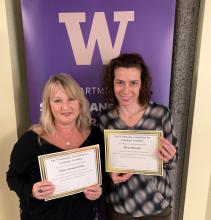This autumn several SPS faculty presented their research and other work nationally and internationally at colleges, universities and language conferences.
Senior Lecturers Marilis Mediavilla and Sabrina Spannagel presented at the 2019 WAFLT Conference “Where World Language Educators Connect!” on October 12th “The Secret to Student Engagement in the Foreign Language Classroom.” In the session, they used current principles of ACTFL (American Council on the Teaching of Foreign Languages) as a basis to address what motivates today's learners. With audience participation, they explored the roadblocks teachers face when trying to facilitate student engagement, and the reasons for varying degrees of student interest Then, Spannagel and Mediavilla provided the audience with examples and practice activities to show how to engender a higher level of active participation in the classroom and remove the barriers to motivate even the most reluctant learners.
Senior Lecturer Jorge González-Casanova presented “Everyone Loves the Communicative Approach but… What Is It Really?” at the 2019 COFLT Fall Conference on October 12th. As the conference abstract reads “today, most language instructors and institutions champion Communicative Language Teaching. However, there seems to exist some confusion as to what constitutes an actual communicative event. Based on the theories of Bill VanPatten, this presentation [discussed] what communication in the context of second language acquisition is, as well as what it means for a language to be implicit, abstract, and complex.”
Principal Lecturer Inma Raneda-Cuartero presented "Assessment for Learning: The Key to Success in the Foreign Language Classroom" at the 2019 COFLT Fall Conference on October 12th. The main objective of this presentation was, according to the conference “to reflect and discuss on the role that assessment for learning plays as a learning tool.” Using research evidence, she “explained the concept of assessment for learning and describe four strategies that have proven effective in increasing student learning.”
Professor Anthony Geist presented On October 14th at the Festival Cervantino in Guanajuato, Mexico the bilingual anthology of border poetry –Poética sin fronteras / Poetics without Borders (2018) for which he edited and wrote the introduction. Around October 17th he also gave a presentation the same anthology at the Encuentro de Poetas Migrantes in San Luis Río Colorado, and nearby Arizona Western College, on the American side of the border, as well as a poetry reading at the César Chávez Cultural Center. Together with co-editor Antonio Sánchez and poet Alejandro Aguilar Zeleny did a reading from the anthology at La Librería bookstore, on the Mexican side of the border.
Professor Ana Fernández Dobao presented at Arizona State University on November 14th Languaging during L2 writing: What influences the nature and outcomes on Languaging at the Symposium on Second Language and Writing November 13-16. The colloquium “brings together a set of empirical studies investigating different forms and modes of languaging in writing and revision-related activities.” Papers presented “will be published in a volume edited by N. Storch and W. Suzuki under the title Languaging in language learning and teaching: A collection of empirical studies.” Prof. Fernández Dobao’s paper “focuses on languaging in collaborative activities between Spanish heritage and second language learners.”
Professor Leigh Mercer presented at University of British Columbia on her course Hispanic Film Programming and the Film Festival Phenomenon on November 15th. Quoting from her abstract for the course “Faculty in language and literature and area-studies departments are increasingly asked to organize film series, design exhibits, and assist in the administration of archives, and yet PhD programs in these departments rarely prepare graduate students for such endeavors. Film festivals in particular offer scholars an opportunity to connect with broader audiences, and this course seeks to train graduate students in the critical implications of festival organization. Students in my course gain both practical programming experience and a greater historical understanding of the film festival as a phenomenon, while also examining what it means to translate their area studies expertise for new publics.”
Materials for this article provided by Ana Fernández Dobao, Anthony Geist, Jorge González-Casanova, Marilis Mediavilla, Leigh Mercer, Inma Raneda-Cuartero, and Sabrina Spannagel.
